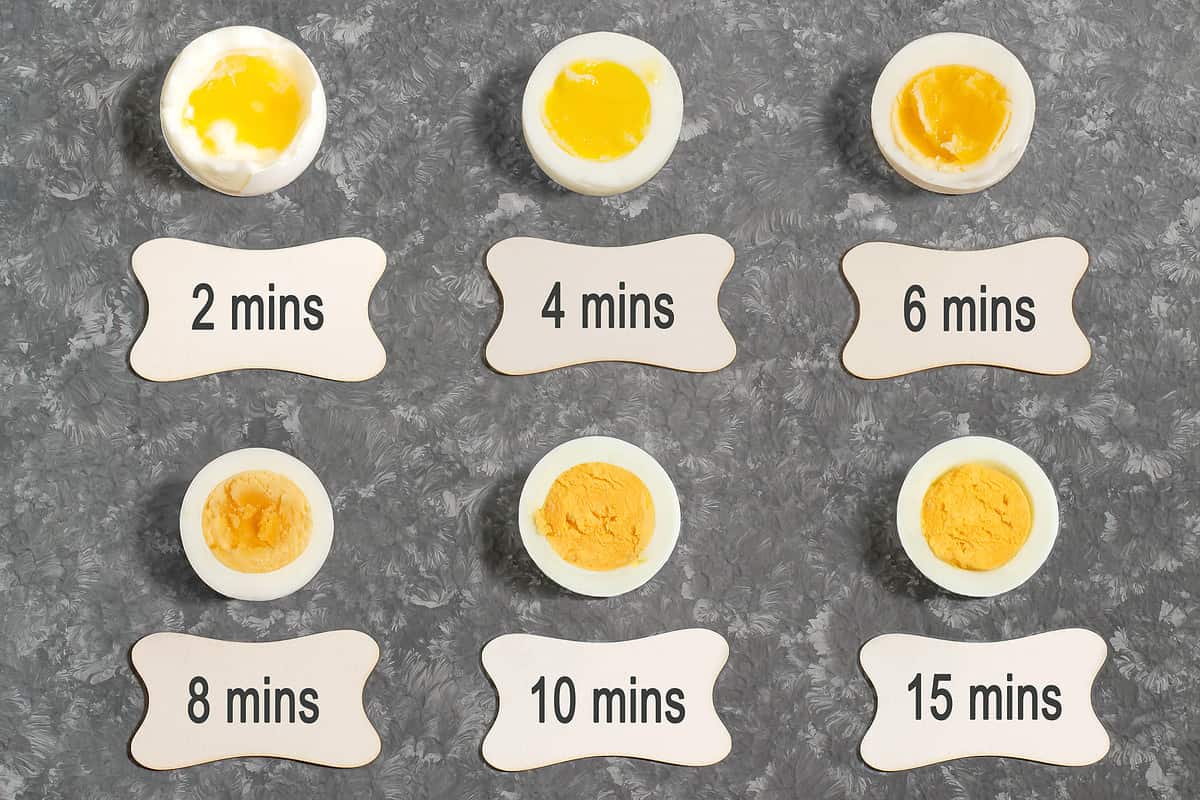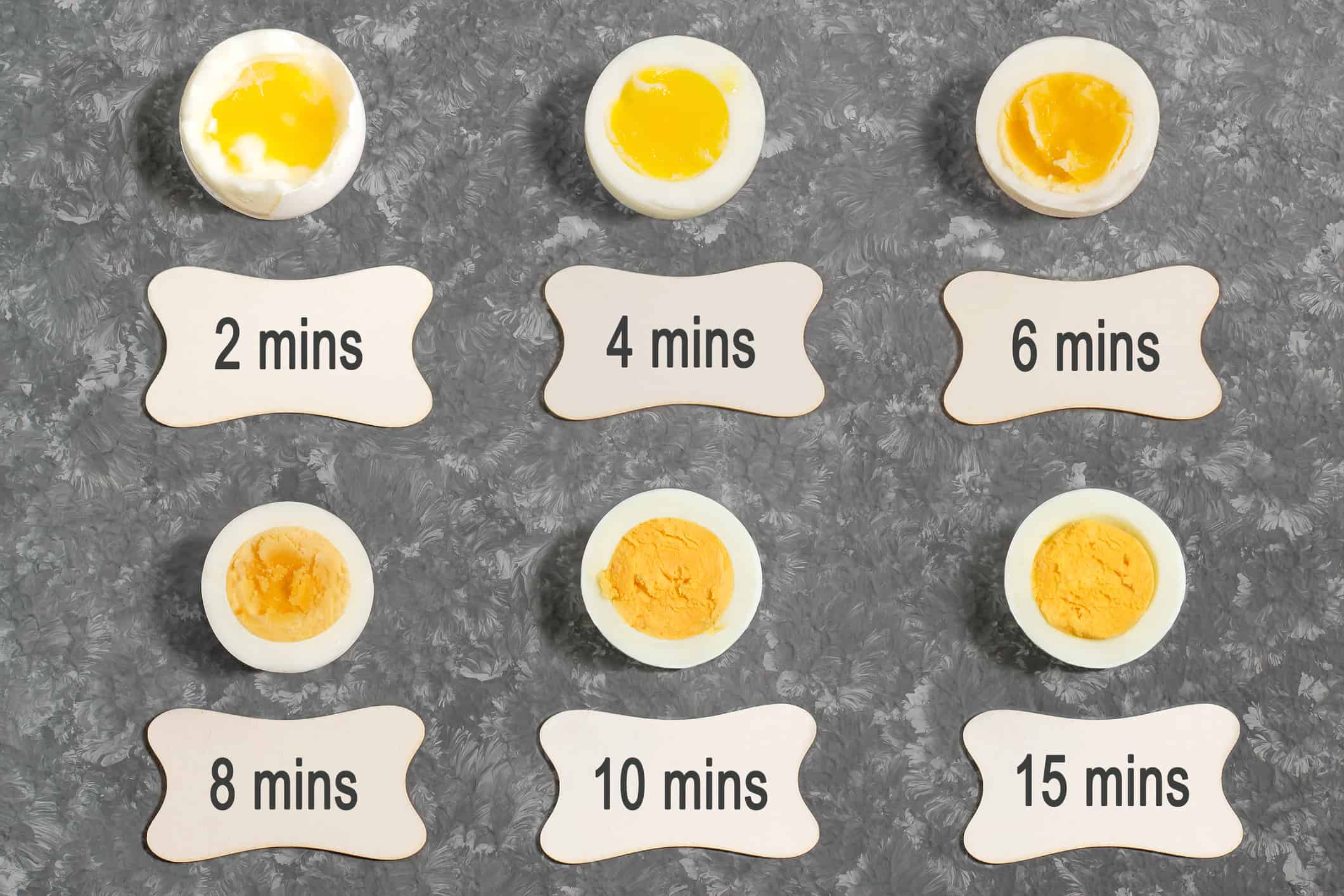Learning how to cook hard-boiled eggs perfectly is much more complex than you might realize. Undercooking hard-boiled eggs creates a mushy consistency. While cooking them for too long, it gives them a bitter taste. You can still eat them, but they won't taste as good.
Hard-boiled eggs were first invented in Ancient Rome, around 5,000 B.C. Since then, hard-boiled eggs have been a modern part of cultural foods. They are popular in many American dishes, like egg salad, egg toast, pickled eggs, and more. However, the first step is learning to master making hard-boiled eggs. When you master that step, everything is easier.
This guide explores everything you need to know about hard-boiled eggs. We look at the three unique steps to making them and how to follow them. We also look at the common mistakes behind making hard-boiled eggs.
What Are Hard-Boiled Eggs?

Cooking time and degree of readiness of boiled eggs. Boiled eggs in cut and label with time. Flat lay, top view
©iStock.com/13 Smile
A hard-boiled egg is exactly what it sounds like. It's an egg that's boiled and becomes hard inside. It's when the yolk and the egg white are fully cooked inside.
There are many ways to make eggs beyond hard-boiled, like scrambled, poached, baked, coddled, shirred, and pickled. Hard-boiled eggs, however, are considered one of the favorites. They can be used to make different meals.
Here are the most popular ways to eat hard-boiled eggs with meals or snacks:
- Smoked salmon egg salad
- BLT Chicken salad
- Almond chicken salad
- Scotch eggs
- Curried egg salad
These are only some ways to make hard-boiled eggs as a meal. You can also try different recipes or create your unique recipe.
The First-Step: Boiling
Learning how to make hard-boiled eggs is simple. You only need to follow three steps to create the perfect hard-boiled eggs.
The first step is to get a pot of water. Depending on how many eggs you'll hard-boil, you want to ensure that you have enough water so the eggs don't touch the bottom of the pot because this could prematurely cause them to crack.
After boiling the water, you carefully place the eggs in the pots. Adding the eggs will cause them to float. Set a timer for 12-15 minutes as they boil. Make sure the heat on the stove isn't turned up all the way or else it will boil over, and avoid putting a lid on the pot.
The Second Step: Ice Bath
The next step is the ice bath. When the timer is up, drain the water and create a pot or bowl of ice water. You will then add the hard-boiled eggs to the ice water. Remember, the eggs will be hot, so you must be careful not to burn yourself.
You want them to sit in the ice bath for 10-15 minutes so they harden and are ready to peel. Ensure you add plenty of ice and that the water is cold.
If you choose not to eat them immediately, you can avoid peeling them. Just remove them from the ice water and put them in a bowl in the fridge. Hard-boiled eggs typically last 6-7 days. You'll notice browning on the inside of the egg if it's starting to go bad.
The Third Step: Peeling
The final step when making hard-boiled eggs is the most exciting part. It's peeling the hard-boiled eggs after they're soaked in an ice bath for 10-15 minutes.
One of the reasons for soaking them in an ice bath is so you can have an easier time peeling. While the peeling process may take some work because you have to do it by hand, eating hard-boiled eggs is ultimately worth it.
Common Mistakes to Avoid
As with cooking anything, you want to avoid mistakes that could ruin your hard-boiled eggs.
For example, one of the most common mistakes is overcooking them. If you're eggs smell and taste like sulpher, you're likely overcooking them. Another common mistake is cramming as many eggs as possible in a pot.
Another mistake is adding fresh eggs to boiling water. You want to ensure that you add the eggs to cool water and then turn the stove to warm the water to a boil.
How to Cook Hard-Boiled Eggs: Final Tips to Consider
One of the best tips to consider when making hard-boiled eggs is using a spoon. You want to ensure you're using a spoon to take the eggs out of the hot water and transfer them to the ice bath. You can also use a ladle. Another tip to consider when peeling is to gently tap the egg on the edge of a bowl so you don't break the entire egg.
Overall, the process of making hard-boiled eggs isn't overly complicated. The key is to practice and learn what works. You learn what mistakes to avoid and how to speed up the process.
The image featured at the top of this post is ©iStock.com/13 Smile
